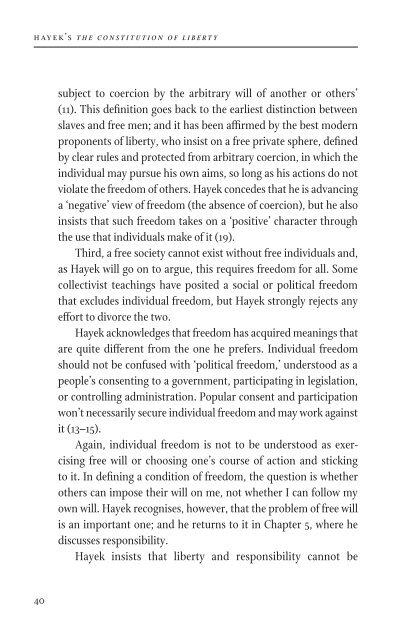Hayek's The Constitution of Liberty - Institute of Economic Affairs
Hayek's The Constitution of Liberty - Institute of Economic Affairs
Hayek's The Constitution of Liberty - Institute of Economic Affairs
You also want an ePaper? Increase the reach of your titles
YUMPU automatically turns print PDFs into web optimized ePapers that Google loves.
h ay e k ’ s t h e c o n s t i t u t i o n o f l i b e r t y<br />
i n d i v i d ua l f r e e d o m , c o e r c i o n a n d p r o g r e s s<br />
subject to coercion by the arbitrary will <strong>of</strong> another or others’<br />
(11). This definition goes back to the earliest distinction between<br />
slaves and free men; and it has been affirmed by the best modern<br />
proponents <strong>of</strong> liberty, who insist on a free private sphere, defined<br />
by clear rules and protected from arbitrary coercion, in which the<br />
individual may pursue his own aims, so long as his actions do not<br />
violate the freedom <strong>of</strong> others. Hayek concedes that he is advancing<br />
a ‘negative’ view <strong>of</strong> freedom (the absence <strong>of</strong> coercion), but he also<br />
insists that such freedom takes on a ‘positive’ character through<br />
the use that individuals make <strong>of</strong> it (19).<br />
Third, a free society cannot exist without free individuals and,<br />
as Hayek will go on to argue, this requires freedom for all. Some<br />
collectivist teachings have posited a social or political freedom<br />
that excludes individual freedom, but Hayek strongly rejects any<br />
effort to divorce the two.<br />
Hayek acknowledges that freedom has acquired meanings that<br />
are quite different from the one he prefers. Individual freedom<br />
should not be confused with ‘political freedom,’ understood as a<br />
people’s consenting to a government, participating in legislation,<br />
or controlling administration. Popular consent and participation<br />
won’t necessarily secure individual freedom and may work against<br />
it (13–15).<br />
Again, individual freedom is not to be understood as exercising<br />
free will or choosing one’s course <strong>of</strong> action and sticking<br />
to it. In defining a condition <strong>of</strong> freedom, the question is whether<br />
others can impose their will on me, not whether I can follow my<br />
own will. Hayek recognises, however, that the problem <strong>of</strong> free will<br />
is an important one; and he returns to it in Chapter 5, where he<br />
discusses responsibility.<br />
Hayek insists that liberty and responsibility cannot be<br />
separated. <strong>Liberty</strong> requires that the individual ‘must bear the<br />
consequences <strong>of</strong> his actions’ (71). Without responsibility in this<br />
sense, individuals would be unable to learn from their experiences<br />
and to enjoy personal growth. Moreover, a free society ‘will not<br />
function or maintain itself unless its members regard it as right<br />
that each individual occupy the position that results from his<br />
action and accept it as due to his own action’ (71). Scientific determinism<br />
teaches, however, that actions result not from one’s own<br />
free choice, but from circumstances beyond one’s control; and<br />
many believe that this scientific teaching has destroyed the basis<br />
for individual responsibility.<br />
Hayek does not reject determinism altogether. <strong>The</strong> conception<br />
<strong>of</strong> responsibility ‘rests, in fact, on a determinist view’ – the view<br />
that actions follow from such ‘internal’ causes as emotion and<br />
habit (73). This raises the question <strong>of</strong> ‘inner freedom,’ or whether<br />
internal causes deprive actions <strong>of</strong> their voluntary character. Hayek<br />
does not pursue this question, since he is concerned with a determinist<br />
teaching that looks to external rather than internal causes<br />
<strong>of</strong> action. This form <strong>of</strong> determinism is an <strong>of</strong>fshoot <strong>of</strong> nineteenthcentury<br />
physics. It holds that our actions and mental operations<br />
are necessarily determined by material circumstances ‘external’ to<br />
the actor.<br />
In refuting scientific determinism, Hayek does not try to show<br />
that it is false, but only that it is wrong pragmatically. It conflicts<br />
with what we believe to be the case when we urge people to observe<br />
certain rules. Experience leads me to believe that my admonitions<br />
will make a difference in a person’s conduct, and I want that<br />
person to believe that he should choose the responsible path; but<br />
the truth is that neither <strong>of</strong> us knows whether free choice is possible<br />
or whether praise and blame can make a difference (72–6).<br />
40<br />
41












